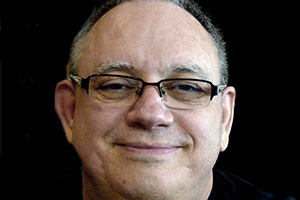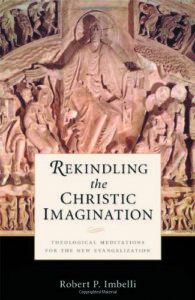Priest’s book calls us to focus on Christ
[dropcap type=”4″]I[/dropcap] slipped and it’s time for a public confession: I reviewed a book with the “T” word in it – theology. I know we want the how-to, the what-for, the journey book, but once in a while we Catholics should give ourselves over to theology and talk about the science of God.

Fr. Robert P. Imbelli’s new book, “Rekindling the Christic Imagination: Theological Meditations for the New Evangelization,” is a book that takes us to a place where we should be and where we should have been all along.
Fr. Imbelli begins by comparing the work of Catholic theologian, Charles Taylor, and Pope Benedict XVI. His premise is that the liturgical changes of Vatican II, specifically the change in direction of the celebrant toward the congregation and use of the vernacular, has what he calls a “horizontalism” to it, a spreading out instead of a movement upward, in which the centrality of Christ is somewhat obscured; in other words, making the Mystery accessible makes it appear less of a Mystery according to the manner in which the congregation sees it. This obscuring, combined with the postmodern cultural milieu, makes a crisis of faith almost inevitable.
Charles Taylor explains this when he writes “we have for the most part lost the sustaining environment of neighborhood and community that made belief seem normal and natural.”[quote_box_left]
Rekindling the Christic Imagination: Theological Meditations for the New Evangelization

Publisher: Liturgical Press
Author: Fr. Robert P. Imbelli
Release Date: Feb. 10, 2014
Length: 152 pages
Price: $16.55
ISBN 13: 978-0814635506
Order from: Amazon.com
[/quote_box_left]
Of course, we all know that the family is the core social unit and that the sacred reverence for life needs to be prevalent in order for family to occur. Taylor critiques secularity’s blind spots when he further writes “rampant individualism is its promotion of the buffered “self,” allergic to relational entanglements and commitments. A further symptom of secularity’s malaise is its apparent rejection of any transcendental reference, and its practical atheism that risks confining humanity in a one-dimensional world.”
This distinction between Catholicism and secularism is an important one because we need to proclaim in our new evangelization that Catholicism offers the fullness of the human condition. We take the joy and the sorrow and make it the spectrum of our lives and we believe that knowledge is more than the test tube or theory. No purely secular scientist has ever given us revelation and yet Catholics have been at the forefront of scientific discovery throughout history. Copernicus, who developed the theory of the solar system and Georges Lemaître, father of the Big Bang Theory, were both Catholic priests. I once had a discussion about the fact of monumental Catholic work in the sciences with an atheist physicist. He said that all the Catholic scientists he knew were able to compartmentalize very well. This really meant that his own limiting, one-dimensional thinking would not allow him to believe anything else. I told him that it was true, Catholics have one big compartment and we label it “God,” that our scientific curiosity and knowledge is merely a search to understand God and His creation.
Alas, however, this went completely over his head — the lights were on but no one was home!
Pope Benedict XVI has written extensively on secularization noting what he called “the dictatorship of relativism,” the tyrannical limiting of knowledge to the single dimension and the striking down of necessary absolutes. But what do Fr. Imbelli, Charles Taylor, and Pope Benedict want from us?
The secret is in the action: the “New Evangelization.” We all know that the new evangelization is the same as the old ancient evangelization of the early Church but, this evangelizing power has been obscured and what they want is our newness, the conversion of hearts from our present-day duality, that religion is there and we are here, a complete Eucharistic transformation that we find in Scripture itself: “If anyone is in Christ, he or she is a new creation; the old has passed away, behold the new has come!” (2 Cor 5:17)
Rekindling the Christic imagination, thus, is the re-centering of the person, Jesus Christ in our lives, so that we may vibrantly spread the Good News amid the postmodern, the secular, the relative, atheists, and in the face of war, famine, despair, and persecution.
Though this is a book on theology, it is a small book, not overwhelming, and its message is powerful, fueled by the source and summit of our Christian being. If you can read this book, read it.






